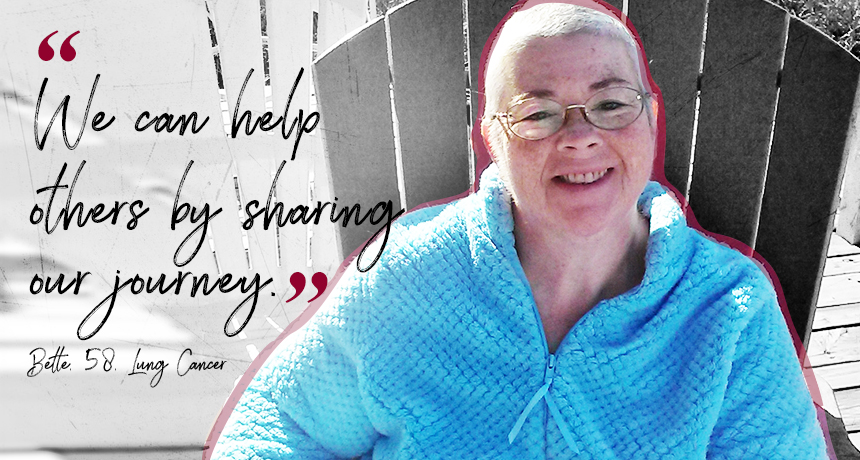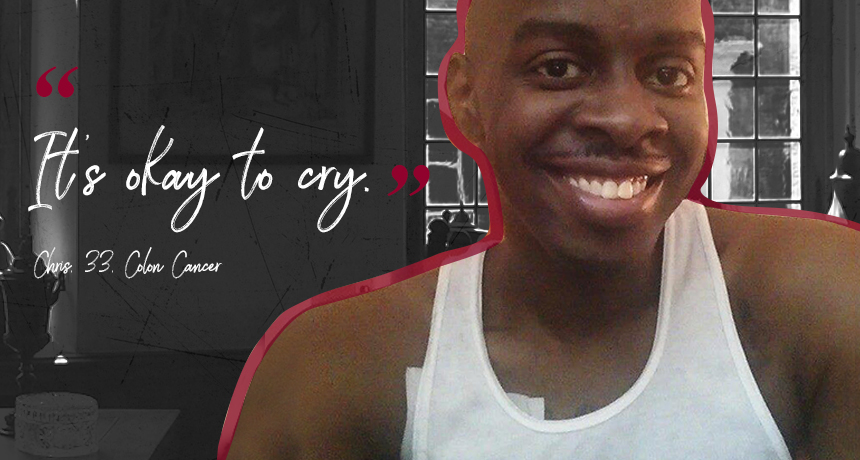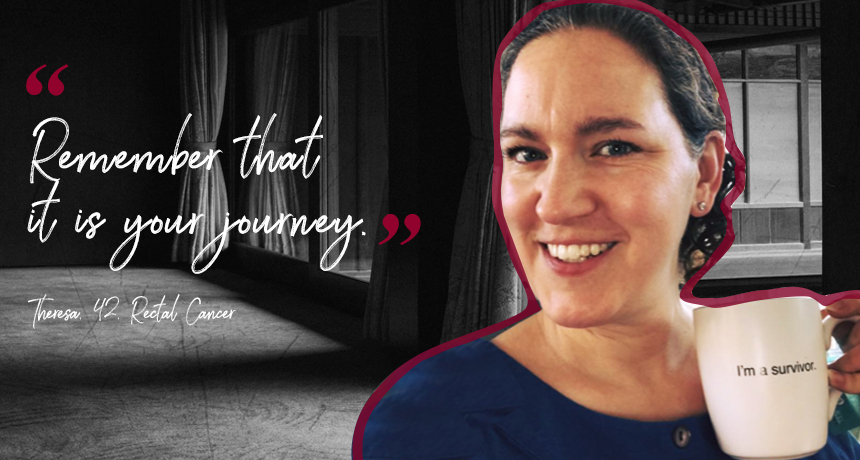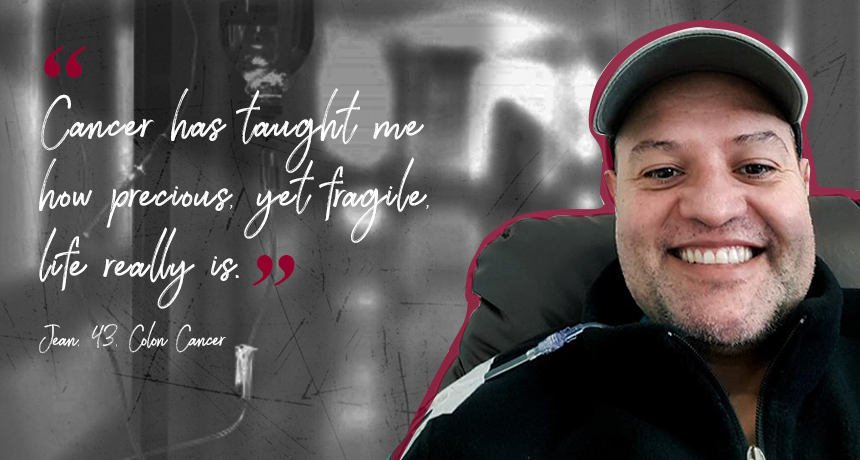What It's Really Like To Go Through Difficult Chemotherapy
Developed in partnership with Health Stories Project.
'Chemotherapy'. It's one of the first words that come to mind when someone thinks about cancer. Chemotherapy is a type of treatment that includes a medication or combination of medications, with the goal of stopping or slowing the growth of cancer cells.
Although it sounds simple, it isn't. There are many types of chemotherapy drugs and a wide variety of reactions that a patient may experience. Some given low dose chemo may experience few to no side effects, while others who require higher doses may encounter many unwanted reactions, far beyond hair and weight loss.
Our friends at Health Stories Project wanted to start an open, honest conversation about difficult chemo, so we reached out to a few members of the #IHCFamily to talk about what they've been through. Each of the stories below represents the light that is at the end of the 'chemo tunnel' and serve as a reminder to those currently going through a rough chemo experience that you CAN get through this.
It is so important to talk about what you are going through, not only to help yourself, but to help the next person, too. Together we can get through this.
Interested in sharing your experience? Health Stories Project is looking for people who have had strong chemo and want to share their story. Learn more here.
Bette, Stage Unknown, Lung Cancer Survivor

It all started with a cough. I was sleeping less and less, and as the cough continued to get worse over the years, work became increasingly difficult. It was hard to deal with customers in our little antique store, harder and harder to clean the rooms in our little motel, and almost impossible to do business on the phone.
All from the constant coughing.
Fast forward through a Lung Function Test, X Lung Function Test: also called Pulmonary Function Tests, include a variety of tests that check how well the lungs work. a CAT Scan X CAT Scan: an X-ray image made using computerized axial tomography that shows more detail than a regular x-ray, and a bronchoscopy, X bronchoscopy: a procedure that looks inside the lung airways and is used to find the cause of a lung problem and you'll get to the diagnosis: non-small cell squamous carcinoma lung cancer. The night that I got the diagnosis, I looked it up. "Oh! Man! I am so screwed!" I thought.
I got my chest port put in on one of the last few days of 2014, and the day after that, my first round of chemo. I had Cisplatin X Cisplatin: an anti-cancer ("antineoplastic" or "cytotoxic") chemotherapy drug used to treat testicular, ovarian, bladder, head and neck and non-small cell lung cancer. It may also be used to treat other cancers. as my chemo treatment. We thought, since I'm a burly gal and pretty much immortal, it would go smoothly. It didn't...
The first round saw me so pukey sick that I was unable to eat or drink for days. I became dangerously dehydrated. Bedridden and floating in a dreamlike state by day 6, hubby recognized it as a downward spiral. A trip to the ER, dissolving anti-nausea pills and bags of fluids brought me back. Ten days of fluids followed that, as well as after each chemo, with anti-nausea medicine, potassium, magnesium, and steroids in each bag. I was, finally, able to keep down water and mac & cheese once in awhile.
After each chemo, Neulasta X Neulasta: a bone marrow stimulant that can help the body make white blood cells after receiving cancer medications. shots helped keep my white blood counts up.
There are many other side effects I experienced throughout chemo:
- Constipation: I'd have terrible diarrhea for a few days, which we expected, but then came severe constipation. A few times I thought I'd have to go to the hospital. I found relief using cherry Milk Of Magnesia X Milk Of Magnesia: a laxative medication used to treat occasional constipation as well as symptoms caused by too much stomach acid.
- Hair Loss: I lost all my body hair and my head started getting painful little bumps all over. I used a loofah washcloth and eucalyptus shampoo, which healed the bumps and prevented new ones.
- Skin & Nails: My skin began to slough off my feet which led to cracked and bleeding heels. My fingertips got painful papercut type cracks on them too. Eucerin cream helped the healing and prevented new wounds. Some of my toenails came off and, though it didn't hurt, it was a creepy feeling.
- Neuropathy: X Neuropathy: a term that refers to general diseases or malfunctions of the nerves. Neuropathy developed in my feet and hands, so I had to be careful walking and using hand-railings.
- Smells & Taste: From the onset my senses of smell and taste changed. Few things smelled normal. Everything stunk of body odor, dirty clothes, burnt food, etc… Peppermint essential oils helped with that as well as with the constant nausea. Foods turned against me too. Spaghetti tasted like tomato paste, watermelon like ammonia smells, and so on.
- Memory (Chemo Brain): My memory and ability to articulate really took a hit. I'm not the brightest bulb in the sign anyway, so it was (still can be) so frustrating. As if I suddenly developed A.D.D./Alzheimer's! Very scary until I understood that it was the chemo causing it.
- Emotions: Oh, the emotions! Bursting into tears for no reason! Deep, inexplicable, sorrow was like a stalker attacking when least expected!
If you can catch some of the potential problems before they add to an already crappy situation, this part of your journey will be less of a struggle. And please, until you know how the chemo will affect you, don't do it alone. Your helpers need to watch for the signs of dehydration as it's deadly and insidious.
Help others by sharing your chemotherapy experiences. Health Stories Project has an opportunity for you to make a difference.
Chris, Stage III Colon Cancer Survivor

For a while, the only symptom that I’d experienced was blood in my stool. Attempting to “WebMD” diagnose myself, I concluded that it was something like internal hemorrhoids. It started only as spots but eventually became much heavier and darker. A week after I turned 29, many more symptoms developed. I grew incredibly weak. I started losing weight rapidly. I began leaking mucus-like fluid from my bottom, and I was experiencing severe abdominal cramps. My body told my mind that I was already full, so I couldn’t eat; and I could barely get out of bed (except to run to the restroom to relieve myself of the excessive diarrhea). I got some scans done at the ER, and they determined that it was ulcerative colitis X Ulcerative Colitis: A chronic, inflammatory bowel disease that causes inflammation and ulcers (sores) in the digestive tract. or Chron’s Disease. X Chron’s Disease : A chronic inflammatory bowel disease that affects the lining of the digestive tract.
It wasn’t until I sought some serious help that I was diagnosed with Stage 3, Level C X Level C: Referring to Dukes' staging system for bowel cancer; Dukes’ C means the cancer has spread to at least one lymph node in the area close to the bowel.. colon cancer.
My chemotherapy experience was very intense. It made me incredibly weak and tired. I could barely eat because everything would come back up. I couldn’t eat or drink anything cold. I couldn’t keep anything down, and I vomited often. It made me weak and tired; and, at one point, I was on a very high dosage that I didn’t know whether I was coming or going.
For the first month, I was undergoing chemotherapy and radiation at the same time. That was a very rough time, because (on most days) I could barely get out of bed. I had no control over it and there was nothing that I could do to prevent it. It was so hard to feel helpless. For a long time, I was told that surgery wasn’t an option and that I would be sustained on chemotherapy for the rest of my short life. My family and friends were watching me become drastically smaller and weaker; and, instead of dealing with my emotions, I had to be strong for them – convincing them that I was fine and that it really wasn’t that bad. Overall, I just felt a major lack of control over my life. (WOW… I haven’t talked about this in awhile. I didn’t realize how emotional it would make me).
Despite how difficult my chemo experience may have been, I feel confident in my choice to receive chemotherapy. Trusting God and my team of doctors saved my life. Without the treatment, I would have never been able to be cancer free. I wouldn’t be alive.
If you are about to start chemo, I want you to know that it may not be easy, but that it is bearable. Trust your oncologist. It’s okay to cry. I’m here and I understand what you’re about to go through.
Health Stories Project connects people with opportunities to make a difference. Learn more about sharing your cancer experiences.
Theresa, Stage III Rectal Cancer Survivor

I went to see my doctor because I realized rectal bleeding wasn’t normal. I was sent for a colonoscopy where I was diagnosed with Stage III Rectal Cancer. I was 34 years old and a vegetarian for 25 years, non-smoker, social drinker with no family history of Colorectal Cancer.
My treatment plan included six weeks of daily radiation combined with Xeloda, X Xeloda: a drug used for chemotherapy. oral chemotherapy. I had a few weeks break to let the radiation do its work. I had a bowel resection X bowel resection: surgery to remove all or part of your bowel. This includes the small intestine, large intestine, or rectum. with a temporary ileostomy. X temporary ileostomy: a surgery to remove part or all of your colon, but at least part of your rectum remains.
I had some drug interactions after surgery and stayed in the hospital for about 2 weeks. I did another round of Xeloda while my port was placed. I had 8 rounds of Folfox X Folfox: a combination of chemotherapy drugs used to treat cancer. , which involved a trip to my cancer center where I would spend about 5 hours there hooked to my IVs and leave with a balloon pump held in a fanny pack. I would go back to be disconnected, and then I would receive my Neulasta shot.
The nurse who was disconnecting my pump said Neulasta was to boost my white blood cell count (WBC). It enabled me to continue my chemo treatments.
Before chemo started, I was nervous about being sick, wondering if I would be nauseated, lose my hair and experience other side effects from toxic chemicals. It turned out, despite all I was going through, I didn’t “look” sick at all. I didn’t lose my hair, and my complexion changed only slightly.
The side effects I was most nervous about didn’t end up playing a huge role, and ones that I had never heard of did: cold sensations would cripple me (so I had mittens for everything), and the neuropathy was bad and seemingly permanent.
The hardest part of my diagnosis was putting on a strong face when I didn’t really know what was in store. My children were 3 and 8 when I was in treatment. How do you take care of your children when you need to be cared for? Luckily, my family is the absolute best. My mom was my primary caregiver since my husband works, and my children are the most empathetic people you will meet. My daughter, now a sophomore in high school, is the co-president of her Relay for Life. I believe cancer positively changed our family.
If you are about to begin chemotherapy, remember that it is your journey. Just because a friend or family member had a side effect doesn’t mean you will too. You are your best advocate, be aware of what you’re going through and tell your medical team. They can’t guess what you’re feeling. Consider sharing your story - I needed a place for friends and family to find information, so I blogged from the day I was diagnosed. It was cathartic. I could say what I was feeling and share my day with people who loved me and wanted to know what I was going through.
Health Stories Project has an opportunity for you share your story with others. Find out more.
Jean, Stage IV Colon Cancer Fighter

I was a health care worker for three and a half years when I discovered that I had severe anemia. After one and a half years of treatment on an oral iron supplement, the anemia got worse, even though I had no visible bleeding.
At the end of 2015 I was managing a big project in a metropolis in Brazil and I felt increasingly exhausted, experiencing chronic fatigue and shortness of breath even when walking a few meters, difficulty concentrating, and I coughed a lot for no reason.
Then the nausea began, mostly to smells. When I tried to eat, I would vomit up most of what I had eaten. I decided to look for a new specialist, who specialized in hematology.
We discovered I had colon cancer with a simple colonoscopy examination.
In early 2016 I went to a proctologist who already wanted me to undergo laparoscopic surgery X Laparoscopic Surgery: also referred to as minimally invasive surgery, describes a specialized technique for performing surgery with the assistance of a video camera and several thin instruments. to remove the tumor in my cecum (CA Colon). I was going to have a few scars and the recovery would be quick. As my father had already died of cancer, I was afraid it might be something else, since my tumor markings were normal.
After a PET/CT scan, we discovered that my Colon Cancer was stage 4, because it had metastasized. X Metastasized: (of malignant cells or disease-producing organisms) to spread to other parts of the body by metastasis.
The news did not affect me much, because I was mentally strong and knew I would fight with all my strength to overcome cancer. I was just scared to die and leave my wife and my daughter, who was 5 years old at the time.
The oncologist treated me with chemotherapy to reduce the tumors. This treatment only limited me to eating certain foods, I had nausea (morning sickness) like a pregnant woman, but ironically no vomiting or any unpleasant reaction to the treatment. After 6 months of chemotherapy, I underwent open surgery to remove all the tumors in my gut and liver. We resumed chemotherapy for 45 days after the surgery. A few months later, metastasis appeared in my liver, which again was surgically removed. By the end of 2016 there was no trace of a tumor. We took a one month break from chemotherapy and we soon did another PET/CT scan. New tumors had appeared in my liver. We continued the same chemotherapy for another 6 months. New metastases appeared in my peritoneum, X Peritoneum: the serous membrane lining the cavity of the abdomen and covering the abdominal organs. retroperitoneum X retroperitoneum: part of the abdominal cavity that lies between the posterior parietal peritoneum and anterior to the transversalis fascia. and enlargement of the liver tumor became evident.
The doctors realized that my body was no longer reacting to the chemotherapy being performed on me. It was then that they changed the treatment to immunotherapy X immunotherapy: treatment that harnesses the innate powers of the immune system to fight cancer. with Cetuximab (erbitux). If the chemotherapy was still working, it was supposed to result in HIPEC. X HIPEC: (Hyperthermic intraperitoneal chemotherapy); a highly concentrated, heated chemotherapy treatment that is delivered directly to the abdomen during surgery.
With six sessions of immunotherapy, I underwent a new PET/CT scan that resulted in a "Complete Metabolic Response", which means that the examination did not detect any tumors in my body. The doctors were shocked by the result because my body reacted extremely well to the new drugs.
I continued with the treatment knowing that there were more tests awaiting me.
The key to success is in our minds, I am always positive, and I do not allow bad news or test results to affect me because I had the chance to fight to be able to conquer cancer.
My journey to hell and back has been a tough one, and it has taught me how precious, yet fragile life really is, and that it’s worth fighting for. I never take one day for granted and live life to the fullest.
Thank you for sharing, Bette, Chris, Theresa & Jean. As Bette said, "Cancer has brought us, fighters, survivors, caretakers, and those who have gone before us, into a kind of family. Connected us. We can help others and ourselves by sharing our journey. That’s what families do." That’s what you all did by taking the time to share your difficult chemo experience and that’s exactly what anyone who shares their story will do for the next person.
Do you or someone you know have experience with strong chemotherapy? Health Stories Project has an opportunity for you to share and help others.
Disclaimer: Please note that this article is not intended to treat, diagnose, or be a substitute for medical advice. Seek the advice of your physician or other qualified health provider regarding your chemotherapy experience.








Team I Had Cancer is the group of people behind the scenes, making sure IHadCancer.com is running, and that you're connecting to the people you need to know for the support and information you need while dealing with cancer.